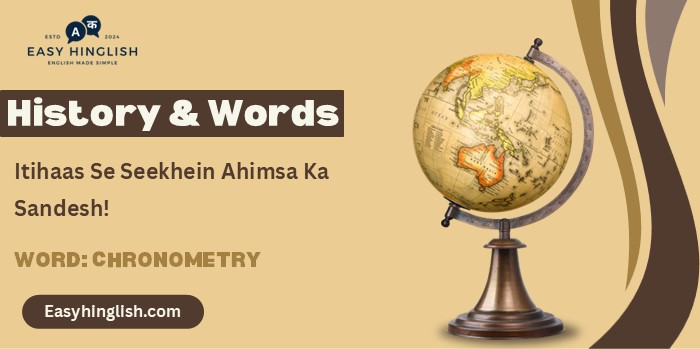History & Words: ‘Chronometry’ (22 March)
Welcome to ‘History & Words’! 🌟 Main hoon Prashant, Wordpandit aur Learning Inc. Network ka founder. Yeh series language learning aur historical context ko connect karti hai, taaki vocabulary improve ho aur history ki understanding bhi deep ho.
Chaliye, shabdon ki iss journey par mere saath chaliye aur naye naye words explore karte hain! 😊
📚 Table of Contents
🔍 Word of the Day: Chronometry
Pronunciation: /krəˈnɒmɪtri/ (kruh-NOM-uh-tree)
Definition: The science of accurate timekeeping and the measurement of time.
🌍 Parichay (Introduction)
22 March 1713 ko British Parliament ne ek aisi committee establish ki jo samay aur space dono ke understanding ko badalne wali thi—The Board of Longitude.
Us samay, longitude (i.e., east-west positioning) ko accurately measure karna impossible tha, jiski wajah se maritime navigation me bhayanak errors aur shipwrecks hote the.
Is challenge ko solve karne ke liye timekeeping ka ek naya discipline janma—Chronometry. Accurate time ko samajhna aur measure karna suddenly sirf astronomy ka kaam nahi, balki survival ka sawal ban gaya.
Aaj hum Chronometry ke madhyam se explore karte hain ki kaise time ka sahi measurement ne duniya ki boundaries ko re-define kiya.
🌱 Shabd ka Utpatti (Etymology)
Chronometry bana hai do Greek shabdon se:
- “Chronos” (χρόνος) – arth: “time”
- “Metron” (μέτρον) – arth: “measure”
Toh Chronometry ka literal arth hua: “the measurement of time.”
Yeh term 18th century ke end tak scientific discourse me standard ban gaya—especially after marine chronometers ki success ke baad.
📖 Mahatvapurn Shabdavali (Key Vocabulary)
- 🔑 Longitude: Earth ka vertical coordinate system—difficult to measure without precise time.
- 🔑 Chronometer: Extremely precise timekeeping instrument, specially designed for ships.
- 🔑 Marine Timekeeping: Navigation ke liye ships par accurate clocks ka upyog.
- 🔑 Greenwich Mean Time (GMT): Global time standard jo chronometry se linked hai.
- 🔑 Isochronism: Clock ka woh characteristic jisme har oscillation same time me hota hai.
- 🔑 Pendulum Clock: Accurate land-based timekeeper—lekin ships ke liye impractical due to motion.
🏛️ Itihasik Sandarbh (Historical Context)
17th–18th century me navies aur merchant ships ke samne ek badi problem thi—longitude determine karna at sea. Latitude toh stars se measure kiya ja sakta tha, lekin longitude ke liye two clocks ka comparison chahiye tha—ek reference clock (home time) aur ek local solar time.
22 March 1713:
- British Parliament ne Board of Longitude banaya.
- Jo bhi accurate timekeeper design karega, use £20,000 prize diya jaayega.
- John Harrison, ek self-taught carpenter, ne marine chronometers (H1–H4) design kiye jo centuries ke liye standard ban gaye.
Yeh Chronometry ka dawn tha—jahan clock ek compass ban gaya.
⏳ Samayrekha (Timeline)
- 1656: Christiaan Huygens pendulum clock invent karte hain.
- 22 March 1713: Board of Longitude form hoti hai—chronometry ka incentive diya jaata hai.
- 1735–1759: John Harrison apne H1 se H4 tak ke marine chronometers develop karte hain.
- 1773: Harrison ko finally £8,750 ka award milta hai—despite bureaucratic resistance.
- 1884: Greenwich ko prime meridian declare kiya jaata hai—GMT become global standard.
- Present Day: Atomic clocks, GPS timekeeping aur deep space navigation chronometry par based hain.
🌟 Is Din ka Mahatva (The Day’s Significance)
22 March 1713 ka din ek signal tha ki:
- ✅ Time sirf calendar ka element nahi—location aur survival ka fundamental tool hai.
- ✅ Chronometry ne ocean navigation, imperial expansion, aur scientific precision ke naya yug ka aarambh kiya.
- ✅ Harrison jaise innovators ne dikhaya ki observation + precision + persistence se impossible possible ban sakta hai.
Yeh din hume yaad dilata hai ki accurate timekeeping sirf clocks ka khel nahi—yeh civilization ka foundation hai.
💬 Prasiddh Ukti (Quote)
“Time is the wisest of all counselors.”
— Pericles
(Matlab: Samay sabse bada teacher hai—aur uska accurate measurement usse samajhne ka pehla kadam.)
🔮 Aaj Ka Matlab aur Chintan (Modern Usage & Reflection)
Aaj Chronometry har field me essential hai:
- ✅ Satellites aur GPS systems time signals ke zariye location calculate karte hain.
- ✅ Quantum clocks timekeeping ke naye accuracy frontiers explore kar rahe hain.
- ✅ Stock trading aur data synchronization me microsecond-level chronometry use hoti hai.
- ✅ Medical devices, AI logs, and astronomical observations bhi exact time ke bina meaningless hain.
Chronometry ka modern lesson simple hai: Progress tabhi possible hai jab hum samay ko accurately track kar sakein.
🏛️ Virast (Legacy)
- ✅ John Harrison ka H4 chronometer Royal Observatory me preserved hai—scientific heritage ka jewel.
- ✅ Board of Longitude ne 18th–19th century ke navigational science ko institutional boost diya.
- ✅ Chronometry ke development ne global time zones, nautical charts, aur transcontinental railways ka base banaya.
- ✅ Aaj ke atomic clocks aur internet time servers usi legacy ko digital form me continue kar rahe hain.
🔍 Tulnatmak Vishleshan (Comparative Analysis)
Pehle: Timekeeping ek religious ya agrarian need thi—prayers aur planting ke liye.
Baad me: Chronometry se yeh scientific navigation aur national defense ka tool ban gaya.
Aaj: Chronometry ek digital backbone hai—internet, finance, AI aur AI ethics tak ke liye.
Yeh evolution dikhata hai ki Samay ka measurement hi manav pragati ka actual scale hai.
💡 Kya Aapko Pata Hai? (Did You Know?)
🎓 Antim Vichar (Conclusion)
‘Chronometry’ ek reminder hai ki samay sirf beeta hua kal nahi—woh ek measurable, usable aur navigable reality hai.
22 March 1713 ko British Parliament ne sirf ek committee banayi thi—but unknowingly, usne ek new age of precision ka darwaza khol diya.
Aaj jab hum GPS activate karte hain, stock trade execute karte hain ya telescope sync karte hain, hum Harrison, chronometers aur time ki science ke debt me hote hain.
📚 Aage Padhne Ke Liye (Further Reading)
- 📖 Longitude – Dava Sobel
- 📖 The Quest for Longitude – William J.H. Andrewes
- 📖 A History of Timekeeping – Chad Orzel
- 📖 The Measurement of Time – Claude Audoin & Bernard Guinot
- 📖 From Sundials to Atomic Clocks – James Jespersen & Jane Fitz-Randolph







